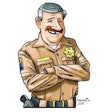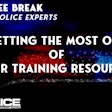"To Protect and To Serve" … "Duty, Honor, Country."
Ours is the best job in the world. However, no place in these oaths does it say anything about how we take care of ourselves while we protect and serve. The culture of the civilian world is very different from the culture of the law enforcement world. The difference is so profound that the new recruit is not always prepared for a culture that does not easily lend itself to teaching how to protect oneself from the damaging effects of stress.
An article by Leah Cook from San Jose State University clearly describes the ways we move our recruits into the law enforcement world. "The uniform, the 'duty' belt, and the marked cruiser are just a few of the ways we say we are different." If recruits are not careful they slowly trade in their civilian families for their new police families. This is never a good idea. Our civilian families keep us balanced. They help us remember that the world is not always dark and dangerous.
It is crucial that law enforcement officers stay emotionally connected to their civilian families-participate in family activities, school events, and "downtime." This is the first step to fighting stress on the job. To keep physically healthy (which helps you to stay emotionally healthy) find some type of exercise you enjoy. Recognize that alcohol will not work as a long-term stress reducer. Figure out passions (that will not get you into trouble) and balance your time among your job, your family, and your hobbies/passions. Be willing and able to recognize when you are on "thin ice" and find someone who you trust to talk to.
Cops Are Different
Anyone who decides to become a police officer already knows the dangers of the street, from the criminal element to driving accidents. There is a common understanding of these demands. What we don't hear about is the hidden danger: the unspoken pressure. Law enforcement officers are a unique group of people who are willing to take on a stressful, difficult job. Law enforcement is also unique because officers are repeatedly exposed to extraordinarily stressful events. This places you at higher-than-normal risk for developing stress reactions.
Daniel A. Goldfarb, Ph.D., identifies "10 reasons cops are
different." On his Website "Heavy Badge," Goldfarb writes:
1. Law enforcement officers are seen as authority figures. People deal with them differently and treat them differently, even when they are not working.
2. They are isolated. The wearing of a badge, uniform, and gun makes a law enforcement officer separate from society.
3. Law enforcement officers work in a quasi-military, structured institution.
4. Shift work is not normal. The "rotating shift" schedule is difficult on an officer's life.
5. Camaraderie can be a two-edged sword. The law enforcement job nurtures a sense of teamwork. It also stimulates a sense of belonging that can create an "us and them" view of the world.
6. The stress for law enforcement is different; it is called "burst stress." Burst stress means there is not always a steady stressor, but at times there is an immediate "burst" from low stress to a high-stress state.
7. Officers need to be in constant emotional control. Law enforcement requires extreme restraint under highly emotional circumstances.
8. Law enforcement offers no "gray areas."
9. The work world of law enforcement is the bad part of society. This may create cynicism and a critical view of the world in general.
10. Children and families are impacted by the officer's job.
[PAGEBREAK]
Because the concept of "off duty" does not exist for most law enforcement officers, they experience a higher rate of divorce, alcoholism, and suicide. Stress is simply defined as an elevation in a person's state of arousal or readiness, caused by a stimulus or demand. As stress arousal increases, health and performance actually improve. Within manageable levels, stress can help sharpen our attention and mobilize our bodies to cope with threatening situations.
But without proper outlets, stress can begin to take its toll on the human body. This is why it is so crucial that officers learn effective ways to manage stress, find balance, and recognize the signs that a fellow officer needs help.
Handling On-The-Job Stress
Officers need to be clear on the signs of stress. These signs can be different depending on the person. When the signs begin to appear, this is when you need to take time for yourself-to rejuvenate, refocus, and repair any damage that has been done.
To Minimize Stress:
1. Get enough rest.
2. Exercise regularly.
3. Maintain a healthy diet.
4. Have a life away from the job.
5. Avoid tobacco, alcohol, drugs, and excessive caffeine.
6. Have a strong network of family and friends.
7. Have a "personal stress plan."
8. Participate in training offered by your department.
9. Get regular physical exams.
10.Maintain your sense of humor.
11. Ask for help if you need it.
What To Do When It Gets Really Bad:
✓ Talking is the most effective treatment for dealing with personal trauma.
✓ Journaling your thoughts and feelings is also helpful. It helps clarify emotions and reduce stress.
✓ Alternate moderate physical exercise with periods of relaxation.
✓ Avoid drugs (especially steroids) and/or alcohol. This can slow down the normal recovery process.
✓ Seek professional help if reactions are prolonged or excessive.
✓ Concentrate on what you can control in your life.
✓ Tell your support system what you need (and what you don't need).
✓ Pamper yourself.
✓ Spend time with others.
✓ Be patient with yourself...never critical. Recover at your own pace.
The stress response becomes problematic when it does not or cannot turn off. This is when symptoms last too long or interfere with daily life. The fight-or-flight response is your body's natural (chemical) reaction to alarm-it makes sure you survive.
Physically, your pulse increases because adrenaline forces the heart to move faster, which sends additional blood to the muscles and organs. Oxygen reaches the lungs and the brain, which keeps you alert, and the brain releases natural painkillers called endorphins.
When this response is in place for an extended period of time, your body eventually suffers damage. People do not suffer severe effects from manageable levels of stress. But law enforcement officers experience chronic stress, and this is potentially very destructive for both physical and mental health. Staying alert to the consequences of prolonged stress and having a plan to combat it is the first step to minimizing the long-term effects and life disruptions that occur.
[PAGEBREAK]
On-the-Job Stress Reducers:
It also helps to attempt to minimize stress while on the job.
Several approaches are used by first responders.
1. Have a clear understanding of individual roles at the scene.
2. Participate in briefings before and after each shift.
3. Partner with someone who is a "veteran" of the job.
4. Rotate your activities from high-stress to lower stress functions.
5. Make sure you take breaks-more breaks if you have had an increase in stress.
6. Establish a "personal space" where you can be yourself, relax, take a break.
7. Reduce noise if possible-especially immediately after an event.
8. Continue to hydrate (remember your body works overtime when you are experiencing stress).
9. Make sure you stay in contact with family and friends after an extremely stressful event.
10. Schedule regular time off (this includes paid details).
How Supervisors Can Help Minimize the Effects of Stress:
1. Set a tone of respect and appreciation for officers.
2. Hold regular meetings to keep lines of communication open and rumors to a minimum.
3. Problem solve as a team.
4. Recognize accomplishments.
5. Promote staff cohesiveness.
6. Clearly communicate rationale behind changes and performance expectations.
7. Resolve conflicts quickly.
8. Acknowledge the stress level and send staff for professional help if necessary.
9. Promote an atmosphere where attention to one's emotional state is acceptable.
10. Use pre-disaster training to help officers prepare.
When You Are Directly Impacted By Violence:
Because law enforcement comes face-to-face with violence and violent crimes at a much higher rate than the average population, special precautions must be taken to protect yourself emotionally. There are some positive steps that you can take when directly impacted by violence.
1. Recognize the impact. (Don't sweep things under the rug and say, "It's my job.")
2. Establish ways to feel personally safe.
3. Respect the way you feel and acknowledge your right to feel that way.
4. Talk about your feelings with people you trust.
5. Connect with other officers who have similar experiences.
6. Be willing to seek professional help.
7. Recognize the triggers that will take you back to a memory.
8. Be patient with yourself-don't make any huge changes in your life.
9. Take care of yourself-eat right, exercise, use deep breathing to relax.
10. Channel your energy and feelings into something positive.
11. Know and believe that you will move past this.
Stress On Your Family
The effects of stress don't end at work. They come home with you. Spouses of police officers face a different set of stressors than other spouses. Relationship skills are regularly tested. Having a strong foundation, constant and complete communication, and overall trust and respect for each other is crucial to keeping a police marriage together.
Relationship Skills
From "Marriage Builders" by Dr. Willard Harley
Know the most important emotional needs:
1. Affection
2. Sexual fulfillment
3. Conversation
4. Recreational companionship
5. Honesty and openness
6. Physical attractiveness
7. Financial support
8. Domestic support
9. Family commitment
10. Admiration
11. Undivided attention
Know the "deal breakers" in a relationship:
1. Lack of empathy for your partner. (It is easier to hurt someone when you don't understand how they feel.)
2. Selfish demands-things that are done because of demands, disrespect, and anger will cause people to eventually resist giving anything at all. Not only do you fail to get what you want...you destroy the love your partner has for you.
3. Disrespectful judgments.
4. Angry outbursts.
5. Annoying habits.
6. Independent behavior-the conduct of the spouse that ignores the feelings and interests of the other spouse. If your decisions are made as if your spouse doesn't even exist, you will find yourself running roughshod over your spouse's feelings.
7. Dishonesty.
Family Plans
Although officers experience daily stress, there is also a possibility of increased stress related to a natural disaster, terrorist attack, or some other catastrophic event. First responders are most likely to get hurt if they are worried and
anxious about the well-being of their families. Again, preparation is the key. Each family should:
1. Maintain an updated list of where people can be reached at any time (change the schedule as necessary).
2. Develop a home safety and evacuation plan-review and update.
3. Create a child care and pet care plan.
4. Design a plan for how family members will contact each other in a crisis (consider having an emergency phone number outside of your regular area code...just in case your phones are completely out i.e. Hurricane Katrina).
5. Know the disaster plans of your children's schools and spouse's workplace.
6. Have an emergency supply box stored in your home and your vehicle. Restock annually.
7. Keep an emergency bag prepared in case deployment does not allow for time to pack.
Stress Resilience
The New Jersey COPS 2 COPS program provides officers with a Resilience Profile. This assessment tool consists of 13
questions that help officers learn more about their personal resilience. The officers are instructed to select one or two of the responses to each statement that best describe the reaction or response they might have had during the past three months. Here is a sample of the questions:
1. While something bad is happening
_____ I believe that things will get better.
_____ I believe that things will only get worse.
_____ I believe that good things and bad things happen equally and they balance one another.
2. When I am faced with adversity
_____ I still find the ability to see humor in things.
_____ I fail to see the humorous side of life.
_____ I see humor in things but feel guilty.
3. When there is a permanent change
_____ I usually take some actions to overcome problems caused by the change, but I never fully accept the new reality.
_____ I tend to use change as an opportunity for learning and growth.
_____ I tend to procrastinate in dealing with problems associated with the change.
4. When I am in distress
_____ I soothe my painful feelings in healthy, and not selfdestructive, ways.
_____ I soothe my painful feelings in unhealthy ways.
_____ I don't soothe my painful feelings because I believe I should tough it out.
Stress on any job is inevitable, but for law enforcement it is a constant companion. Do your best to incorporate these suggestions into your life to have a safe, long, and fulfilling career.
James B. Arey, PhD, LPC, is the commander of the New Orleans Police Department's Crisis Negotiation Team. Ann H.Wilder, LPC, NCC, CADC, LAC, is New Orleans PD's family liaison officer and program director at the DePaul-Tulane Behavioral Health Center in New Orleans.











